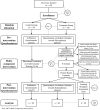Controlled Study of the Impact of a Virtual Program to Reduce Stigma Among University Students Toward People With Mental Disorders
- PMID: 33633613
- PMCID: PMC7900522
- DOI: 10.3389/fpsyt.2021.632252
Controlled Study of the Impact of a Virtual Program to Reduce Stigma Among University Students Toward People With Mental Disorders
Abstract
Stigma toward mental disorders is one of today's most pressing global issues. The Covid-19 pandemic has exacerbated the barriers to social inclusion faced by individuals with mental disorders. Concurrently, stigma reduction interventions, especially those aimed at university students, have been more difficult to implement given social distancing and campus closures. As a result, alternative delivery for programs contributing to stigma reduction is required, such as online implementation. This paper reports the results of a controlled study focused on an online multi-component program on reducing stigma toward mental illness that included project-based learning, clinical simulations with standardized patients and E-Contact with real patients. A total of 40 undergraduate students from the Universidad del Desarrollo in Santiago, Chile, participated in the study. They were randomly divided between an intervention and control group. The intervention group participated in the online multi-component program, while the control group participated in an online educational program on cardiovascular health. We assessed the impact of the program by using the validated Spanish-language versions of the Attribution Questionnaire AQ-27 and the Questionnaire on Student Attitudes toward Schizophrenia with both groups, before and after the intervention. In addition, an ad hoc Likert scale ranging from 0 to 5 was used with the intervention group in order to assess the learning strategies implemented. Following the intervention, the participants belonging to the intervention group displayed significantly lower levels of stereotypes, perception of dangerousness, and global score toward people with schizophrenia (p < 0.001). In addition, participants presented lower levels of dangerousness-fear, avoidance, coercion, lack of solidarity, and global score (p < 0.001). The control group displayed no statistically significant differences in the level of stigma before and after the evaluation, for all of the items assessed. Finally, the overall assessment of each of the components of the program was highly positive. In conclusion, the study shows that online programs can contribute to reducing stigma toward mental disorders. The program assessed in this study had a positive impact on all the dimensions of stigma and all of the components of the program itself were positively evaluated by the participants.
Keywords: E-contact; multicomponent interventions; project based learning (PBL); standardized patient (SP); stigma; stigma reduction programme; undergraduate education.
Copyright © 2021 Rodríguez-Rivas, Cangas and Fuentes-Olavarría.
Conflict of interest statement
The authors declare that the research was conducted in the absence of any commercial or financial relationships that could be construed as a potential conflict of interest.
Figures
Similar articles
-
Reducing Stigma Toward People with Serious Mental Illness Through a Virtual Reality Intervention: A Randomized Controlled Trial.Games Health J. 2024 Feb;13(1):57-64. doi: 10.1089/g4h.2023.0118. Epub 2023 Sep 11. Games Health J. 2024. PMID: 37695822 Free PMC article. Clinical Trial.
-
"This Is Me" an Awareness-Raising and Anti-Stigma Program for Undergraduate Nursing Students: A Pre-Post Intervention Study.Nurs Rep. 2024 Oct 12;14(4):2956-2974. doi: 10.3390/nursrep14040216. Nurs Rep. 2024. PMID: 39449453 Free PMC article.
-
Mental illness through the perspective of undergraduate medical students in Greece: a cross-sectional study at Aristotle University of Thessaloniki.Front Psychiatry. 2023 Oct 31;14:1228539. doi: 10.3389/fpsyt.2023.1228539. eCollection 2023. Front Psychiatry. 2023. PMID: 38025465 Free PMC article.
-
Developing an Educational Package to Improve Attitude of Medical Students Toward People With Mental Illness: A Delphi Expert Panel, Based on a Scoping Review.Front Psychiatry. 2022 Mar 14;13:860117. doi: 10.3389/fpsyt.2022.860117. eCollection 2022. Front Psychiatry. 2022. PMID: 35360140 Free PMC article.
-
Reducing mental illness stigma in health care students and professionals: a review of the literature.Australas Psychiatry. 2014 Dec;22(6):579-84. doi: 10.1177/1039856214556324. Epub 2014 Nov 4. Australas Psychiatry. 2014. PMID: 25371444 Review.
Cited by
-
Religiosity and stigma toward patients with mental illness among undergraduate university students.Heliyon. 2021 Mar 21;7(3):e06565. doi: 10.1016/j.heliyon.2021.e06565. eCollection 2021 Mar. Heliyon. 2021. PMID: 33842707 Free PMC article.
-
The Effectiveness of a Cell Phone eHealth App in Changing Knowledge, Stigmatizing Attitudes, and Intention to Seek Help Associated With Obsessive-Compulsive Disorder: Pilot Questionnaire Study.JMIR Mhealth Uhealth. 2024 Mar 29;12:e48027. doi: 10.2196/48027. JMIR Mhealth Uhealth. 2024. PMID: 38551629 Free PMC article.
-
Implementation and evaluation of the 'Transgender Education for Affirmative and Competent HIV and Healthcare (TEACHH)' provider education pilot.BMC Med Educ. 2021 Nov 4;21(1):561. doi: 10.1186/s12909-021-02991-3. BMC Med Educ. 2021. PMID: 34732178 Free PMC article.
-
Innovative Technology-Based Interventions to Reduce Stigma Toward People With Mental Illness: Systematic Review and Meta-analysis.JMIR Serious Games. 2022 May 30;10(2):e35099. doi: 10.2196/35099. JMIR Serious Games. 2022. PMID: 35635744 Free PMC article. Review.
-
Reducing stigma and increasing competence working with mental illness: Adaptation of a contact-based program for osteopathic medical students to a virtual, active learning format.Med Educ Online. 2023 Dec;28(1):2151069. doi: 10.1080/10872981.2022.2151069. Med Educ Online. 2023. PMID: 36420940 Free PMC article.
References
-
- WHO-AIMS Evaluación del Sistema de Salud Mental de Chile: Segundo inform. Informe Anual Sobre Derechos Humanos En Chile 2014. Ginebra: WHO; (2014). Available online at: https://www.who.int/mental_health/who_aims_country_reports/who_aims_repo...
-
- Mascayano F, Lips W, Mena C, Manchego C. Estigma hacia los trastornos mentales: características e intervenciones. Salud Ment. (2015) 38:53–8. Available online at: http://www.scielo.org.mx/scielo.php?script=sci_arttext&pid=S0185-3325201... (accessed November 11, 2020).
-
- López M. Work and employment for people with severe mental disorders. Some proposals based on the available information. Revi Asoc Esp Neuropsiq. (2004) 24:31–66. Available online at: http://dialnet.unirioja.es/servlet/articulo?codigo=864102&info=resumen&i... (accessed November 11, 2020)
LinkOut - more resources
Full Text Sources
Other Literature Sources
Medical
Research Materials


